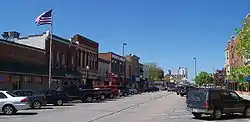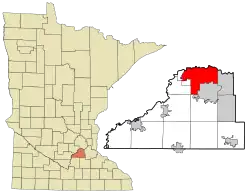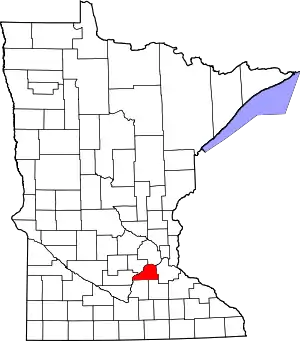Shakopee, Minnesota
Shakopee (/ˈʃɑːkəpi/ SHAH-kə-pee)[5] is a city in and the county seat of Scott County, Minnesota, United States. It is located southwest of Minneapolis. Sited on the south bank bend of the Minnesota River, Shakopee and nearby suburbs comprise the southwest portion of Minneapolis-Saint Paul, the sixteenth-largest metropolitan area in the United States, with 3.7 million people. The population was 43,698 at the 2020 census.[3]
Shakopee, Minnesota | |
|---|---|
 Downtown Shakopee | |
 Seal  | |
 Location of the city of Shakopee within Scott County, Minnesota | |
| Coordinates: 44°46′47″N 93°31′38″W | |
| Country | United States |
| State | Minnesota |
| County | Scott |
| Incorporated | 1857 |
| Government | |
| • Mayor | Matt Lehman |
| Area | |
| • City | 30.21 sq mi (78.26 km2) |
| • Land | 28.87 sq mi (74.77 km2) |
| • Water | 1.35 sq mi (3.49 km2) 4.47% |
| Elevation | 830 ft (250 m) |
| Population | |
| • City | 43,698 |
| • Estimate (2022)[4] | 45,735 |
| • Rank | US: 871st MN: 21st |
| • Density | 1,513.72/sq mi (584.45/km2) |
| • Urban | 2,914,866 (US: 16th) |
| • Metro | 3,693,729 (US: 16th) |
| Time zone | UTC-6 (Central) |
| • Summer (DST) | UTC-5 (CDT) |
| ZIP code | 55379 |
| Area code | 952 |
| FIPS code | 27-59350 |
| GNIS feature ID | 2395854[2] |
| Website | shakopeemn.gov |
The river bank's Shakopee Historic District contains burial mounds built by prehistoric cultures. In the 18th century, Chief Shakopee of the Mdewakanton Dakota established his village on the east end of this area near the water. Trading led to the city's establishment in the 19th century. Shakopee boomed as a commerce exchange site between river and rail at Murphy's Landing.
Once an isolated city in the Minnesota River Valley, by the 1960s the economy of Shakopee was tied to that of the expanding metropolitan area. Significant growth as a bedroom community occurred after U.S. Highway 169 was realigned in 1996 toward the new Bloomington Ferry Bridge.
The city is known for the Valleyfair amusement park and the Canterbury Park racetrack.
History
Burial mounds along the Minnesota River bluff, located within the present-day Veterans Memorial Park, have been dated between 500 and 2,000 years old.[6]
Nicollet referred to the "Village of the Six," a permanent Dakota village south of the river, as acting as a boundary to the Ojibwa. However, historians have since situated it east of the present downtown.[7][8] He noted the village and locality was commonly called the "village of the prairie" (published as tinta ottonwe). The Shakopee band lived in summer bark lodges and winter tipis. They followed the changes of the season when they planted their cornfields.[7]
By the Treaty of Traverse des Sioux, the Sioux tribe ceded land in 1851 and many relocated to Chief Shakopee II's village. The latter people had moved south to what was later assigned to them as the current Shakopee-Mdewakanton Indian Reservation in nearby Prior Lake.[9]
In 1851, Thomas A. Holmes established a trading post west of the Dakota and platted Shakopee Village in 1854, named after Chief Shakopee II.[10] The city quickly grew, incorporating in 1857. It surrendered its charter in 1861 due to conflicts in the Dakota War. As tensions lifted, the city incorporated again in 1870. The western end was left in township status and was renamed as Jackson Township, Minnesota in 1861, likely after President Andrew Jackson.[10]
Geography
According to the United States Census Bureau, the city has a total area of 29.32 square miles (75.94 km2); 28.01 square miles (72.55 km2) is land and 1.31 square miles (3.39 km2) is water.[11]
U.S. Highway 169 and County Highway 101 are two of the main routes in Shakopee. Highway 169 and nearby State Highway 13 connect Shakopee to the rest of the Minneapolis – Saint Paul region. County Highway 101 serves as a major east–west connector route of historic downtown Shakopee.
Demographics
| Census | Pop. | Note | %± |
|---|---|---|---|
| 1860 | 1,138 | — | |
| 1870 | 1,349 | 18.5% | |
| 1880 | 2,011 | 49.1% | |
| 1890 | 1,757 | −12.6% | |
| 1900 | 2,047 | 16.5% | |
| 1910 | 2,302 | 12.5% | |
| 1920 | 1,988 | −13.6% | |
| 1930 | 2,023 | 1.8% | |
| 1940 | 2,418 | 19.5% | |
| 1950 | 3,185 | 31.7% | |
| 1960 | 5,201 | 63.3% | |
| 1970 | 6,876 | 32.2% | |
| 1980 | 9,941 | 44.6% | |
| 1990 | 11,739 | 18.1% | |
| 2000 | 20,568 | 75.2% | |
| 2010 | 37,076 | 80.3% | |
| 2020 | 43,698 | 17.9% | |
| 2022 (est.) | 45,735 | [4] | 4.7% |
| U.S. Decennial Census[12] 2020 Census[3] | |||
2010 census
As of the census of 2010, there were 37,076 people, 12,772 households, and 9,275 families living in the city. The population density was 1,323.7 inhabitants per square mile (511.1/km2). There were 13,339 housing units at an average density of 476.2 per square mile (183.9/km2). The racial makeup of the city was 77.0% White, 4.3% African American, 1.2% Native American, 10.3% Asian, 4.5% from other races, and 2.7% from two or more races. Hispanic or Latino of any race were 7.8% of the population.
There were 12,772 households, of which 45.5% had children under the age of 18 living with them, 57.1% were married couples living together, 10.5% had a female householder with no husband present, 4.9% had a male householder with no wife present, and 27.4% were non-families. 20.4% of all households were made up of individuals, and 5.7% had someone living alone who was 65 years of age or older. The average household size was 2.83 and the average family size was 3.31.
The median age in the city was 32.2 years. 30.2% of residents were under the age of 18; 6.6% were between the ages of 18 and 24; 37.2% were from 25 to 44; 19.2% were from 45 to 64; and 6.8% were 65 years of age or older. The gender makeup of the city was 48.8% male and 51.2% female.
2000 census
As of the census of 2000, there were 20,568 people, 7,540 households and 5,360 families living in the city. The population density was 761.7 inhabitants per square mile (294.1/km2). There were 7,805 housing units at an average density of 289.0 per square mile (111.6/km2). The racial makeup of the city was 91.61% White, 1.33% African American, 0.94% Native American, 2.41% Asian, 0.04% Pacific Islander, 2.14% from other races, and 1.54% from two or more races. Hispanic or Latino of any race were 4.40% of the population.
There were 7,540 households, of which 38.9% had children under the age of 18 living with them, 58.2% were married couples living together, 8.6% had a female householder with no husband present, and 28.9% were non-families. 21.0% of all households were made up of individuals, and 5.7% had someone living alone who was 65 years of age or older. The average household size was 2.66 and the average family size was 3.12.
27.5% of the population were under the age of 18, 8.9% from 18 to 24, 38.8% from 25 to 44, 17.5% from 45 to 64, and 7.4% who were 65 years of age or older. The median age was 32 years. For every 100 females, there were 98.1 males. For every 100 females age 18 and over, there were 94.6 males.
The median household income was $59,137 and the median family income was $66,885 (these figures had risen to $72,523 and $83,235 respectively in a 2007 estimate). Males had a median income of $41,662 versus $32,244 for females. The per capita income for the city was $25,128. About 1.8% of families and 3.5% of the population were below the poverty line, including 3.6% of those under age 18 and 4.4% of those age 65 or over.
Economy
Top employers
According to the city's 2022 Comprehensive Annual Financial Report (CAFR),[13] the top employers in the city are:
| # | Employer | # of Employees |
|---|---|---|
| 1 | Amazon | 2,500 |
| 2 | Valleyfair | 1,600 |
| 3 | School District No. 720 | 1,228 |
| 4 | Emerson | 1,192 |
| 5 | Canterbury Park | 930 |
| 6 | St. Francis RMC | 840 |
| 7 | Entrust Datacard | 800 |
| 8 | Scott County | 751 |
| 9 | Imagine Print Solutions | 600 |
| 10 | City of Shakopee | 325 |
Arts and culture
- Valleyfair is an amusement park.
- The Landing is an 88-acre (360,000 m2) historic village located on the Minnesota River, representing Minnesota life from the 1840 to 1890.
- Canterbury Park is a horse racetrack and card club.
- Minnesota Renaissance Festival is an interactive outdoor event that recreates a fictional 16th Century "England-like" fantasy kingdom.
- Downtown Shakopee features numerous boutiques and restaurants, an old-fashioned bakery, Turtle's 1890 Social Center, riverside concerts, and summertime bi-weekly classic car shows.
- Scott County Historical Society Museum features the historic 1908 Stans House.[14]
Government
United States House of Representatives
- Angie Craig (D-MN-2)
State Legislature
- Eric Pratt (R-SD-54) in the Minnesota Senate
- Brad Tabke (D-HD-54A) in the Minnesota House
Scott County Board of Commissioners
- Barb Weckman Brekke - Precincts 5 and 13
- Jody Brennan - Precincts 1-4, 6-8 and 12A & 12 B
- Dave Beer - Precincts 9A, 9B, 10, 11 and 14
Shakopee City Council[15]
- Matt Lehman - Mayor
- Jay Whiting - Vice Mayor
- Angelica Contreras
- Jim DuLaney
- Jesse Lara
Education
Shakopee Public Schools (ISD 720) include five elementary schools, two middle schools and one senior high school, as well as a couple learning centers. The schools are:[16]
- Red Oak Elementary
- Sun Path Elementary
- Sweeney Elementary
- Eagle Creek Elementary
- Jackson Elementary
- Shakopee West Middle School
- Shakopee East Middle School
- Shakopee High School
- Tokata Learning Center
- Pearson Early Learning Center
- Central Family Center (closed for 2020-2021 School year for renovations)
Shakopee is also the location of the Shakopee Area Catholic Schools.
Living Hope Lutheran School is a Christian Pre-K-8 school of the Wisconsin Evangelical Lutheran Synod in Shakopee.[17]
Shakopee has a campus of the Globe University/Minnesota School of Business, a private career college.
Notable people
- Jamal Abu-Shamala, Jordanian-American basketball player for the Minnesota Golden Gophers
- Jack Bergman, congressman and retired Marine lieutenant general
- Anthony Bonsante, professional boxer and competitor on the reality TV show The Contender.
- Scott Ferrozzo, mixed martial artist who held a 4–2 record.
- Eleanor Gates, playwright
- William Geister member of the Minnesota House of Representatives
- Amy Menke, professional ice hockey player
- Erik Mortensen, former member of the Minnesota House of Representatives
- Harrison J. Peck, lawyer, newspaper editor, mayor of Shakopee and member of the Minnesota Senate
- Jason Perkins, professional basketball player
- Andrew Reiner, executive editor of Game Informer and guitarist in The Rapture Twins
- Maurice Stans, 19th United States secretary of commerce
- Christopher Straub, fashion designer and contestant on Project Runway
- Brad Tabke, former and current member of the Minnesota House of Representatives
- Karie Ploof Tuttle, U of M Gymnastics team on full-ride scholarship, 2-time regional champion, Big Ten balance beam champion, Minnesota Gymnastics Hall of Fame, Shakopee High School Hall of Fame, M Club, and AIAW All-American for gymnastics
In popular culture
- The Daily Show reported on the then fence-less women's prison in Shakopee, and arguments between citizens wanting or not wanting a fence.[18]
- Shakopee was the setting for a Saturday Night Live sketch in 2012,[19] and in 2013 about the fictitious Shakopee Hip-Hop station 'B108FM'.[20]
References
- "2020 U.S. Gazetteer Files". United States Census Bureau. Retrieved July 24, 2022.
- U.S. Geological Survey Geographic Names Information System: Shakopee, Minnesota
- "Explore Census Data". United States Census Bureau. Retrieved August 8, 2022.
- "City and Town Population Totals: 2020-2022". United States Census Bureau. June 25, 2023. Retrieved June 25, 2023.
- "Minnesota Pronunciation Guide". Associated Press. Archived from the original on July 22, 2011. Retrieved July 4, 2011.
- "SMSC To Conduct Prescribed Burn at Shakopee Memorial Park" (PDF). Shakopee Mdewakanton Sioux Community. April 22, 2004. Archived from the original (PDF) on October 29, 2008. Retrieved October 14, 2008.
- "Minnesota River History: People". Joseph R. Brown MN River Center. Retrieved October 16, 2008.
- Joseph Nicolas Nicollet (1976). Joseph N. Nicollet on the Plains and Prairies. Minnesota Historical Society Press. p. 45. ISBN 978-0-87351-290-9. Retrieved October 14, 2008.
- "Mdewakanton Band of the Dakota Nation (Part II)". Minneapolis Public Library. 2001. Archived from the original on September 25, 2008. Retrieved August 19, 2008.
- Warren Upham (1920). Minnesota Geographic Names. Minnesota Historical Society. p. 510. Retrieved October 14, 2008.
- "US Gazetteer files 2010". United States Census Bureau. Archived from the original on January 25, 2012. Retrieved November 13, 2012.
- United States Census Bureau. "Census of Population and Housing". Retrieved February 12, 2014.
- "2022 Comprehensive Annual Financial Report". City of Shakopee, MN. Retrieved June 29, 2023.
- "Home". scottcountyhistory.org.
- "Mayor & City Council | City of Shakopee".
- "Shakopee Public Schools". Archived from the original on June 24, 2013. Retrieved June 4, 2012.
- "Living Hope Lutheran School".
- "The Daily Show with Trevor Noah". Comedy Central. Retrieved March 23, 2018.
- Fiecke, Shannon. "VIDEO: Shakopee makes SNL skit". SW News Media. SW News Media. Retrieved January 23, 2021.
- "'SNL' skit revisits Minnesota 'DJs'". Bring Me The News. Bring Me The News. Retrieved January 23, 2021.

